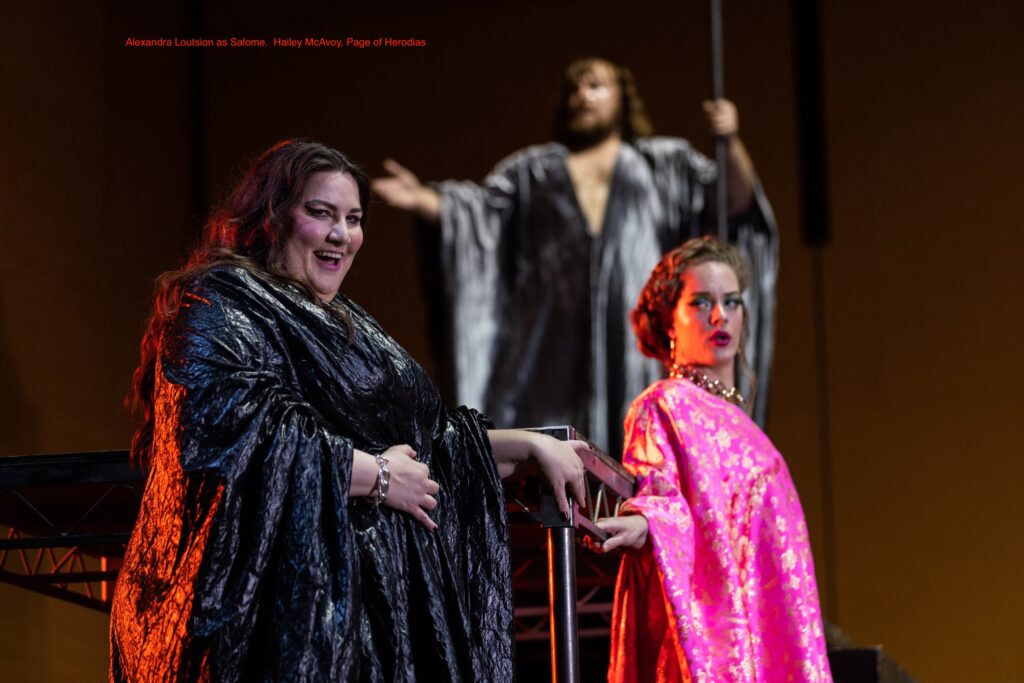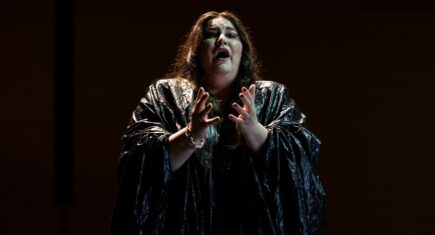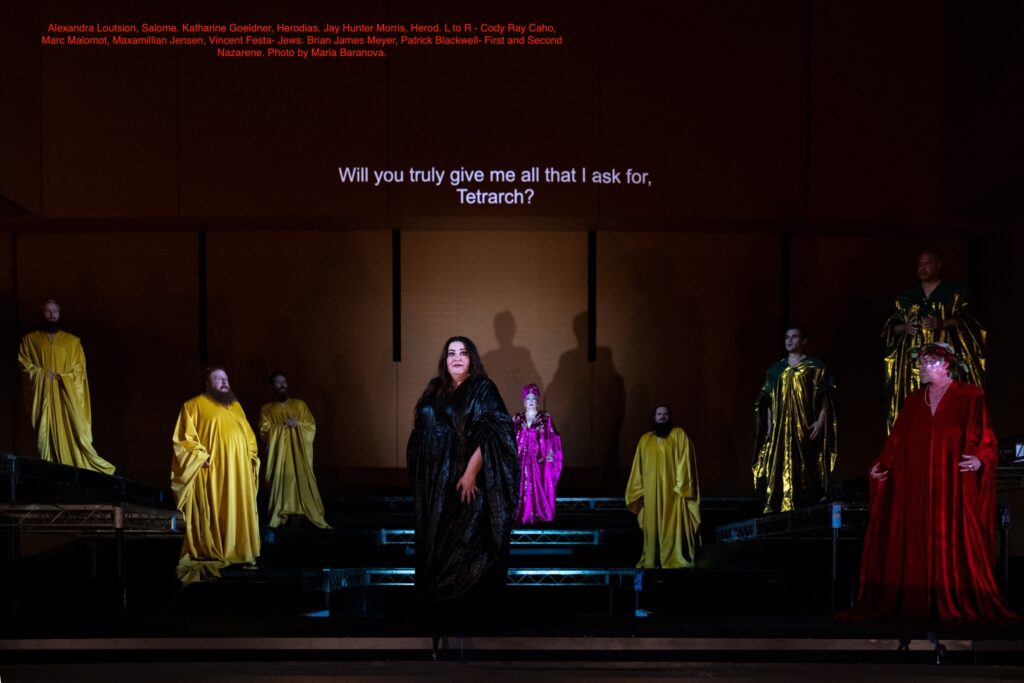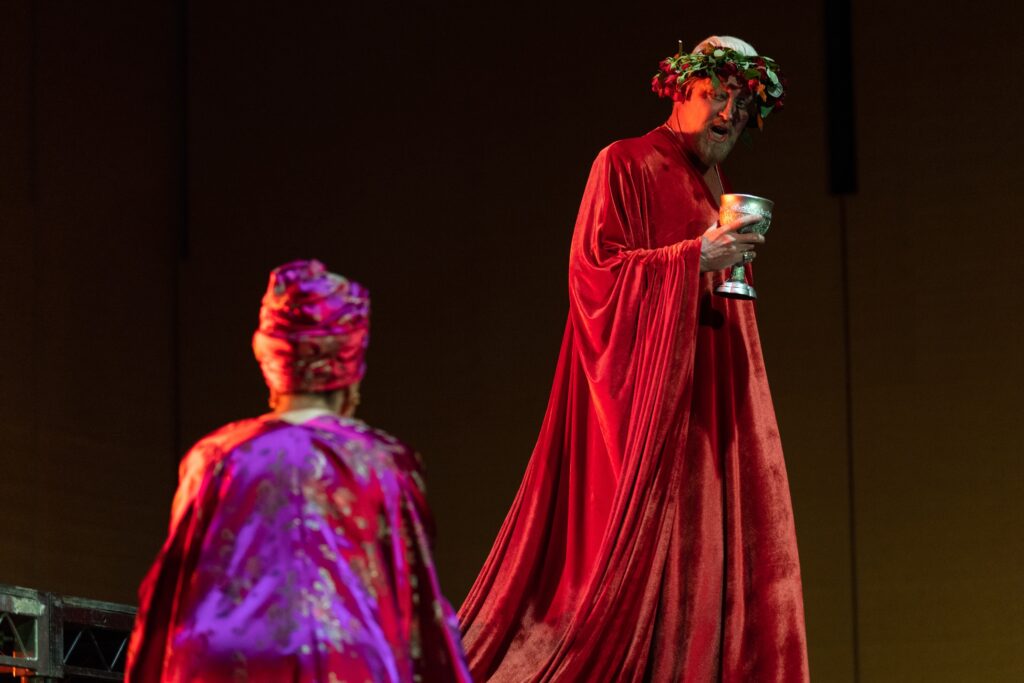SALOME. Music by Richard Strauss. Libretto by Oscar Wilde.
Salome with a twist on stage at Bard
March 18–20. The Bard Conservatory Orchestra joins an exciting principal cast of singers in a semi-staged performance of Richard Strauss’s once infamous, now famous opera, Salome—a biblical story, with a twist. Directed by R. B. Schlather. Bard Conservatory Orchestra. Leon Botstein, music director. Alexandra Loutsion, Salome; Jay Hunter Morris, Herod; Nathan Berg, Jochanaan; Katharine Goeldner, Herodias.
Attended by Robert Levine for Opera Gazet, 18 March, 2022
Music: 4*
Drama: 4*
Salome, Richard Strauss’s first successful opera, premiered in 1905 in Dresden. It took the operatic world by storm, not only for its masterful score, but because it presented a Biblical story with murder, suicide, and necrophilia. Based on Oscar Wilde’s scandalous play of 1892, Salome fetishizes John the Baptist – his hair, his body, his lips – and when she gets his severed head on a platter, lustily kisses it and sings to it for a solid fifteen minutes. Within two years of its Dresden premiere it was performed in 50 other opera houses, banned in dozens (even Gustav Mahler could not get it past the Viennese censors) and after New York’s Metropolitan presented it in 1907, further performances were cancelled due to the story’s “repugnance” to Anglo-Saxon minds.”
The frightfully difficult score is a challenge for any orchestra, and one can only admire the 86 players of the Bard Conservatory Orchestra for undertaking it, let alone conquering it with élan, accuracy, and excitement. From the first, creepily seductive upward riff on the clarinet, Strauss serves up an exotic and somewhat degenerate table of sounds, mostly gorgeously perverse, culminating in a full orchestral upheaval that has been compared to Salome’s orgasm and simultaneous death. The Bard Orchestra consisted of all of the auxiliary wind instruments, including an original hecklephone, 6 different clarinets, and a contrabassoon. The only reduction was in the string section, (by about 20 players) but every part was covered.

Music Director Leon Botstein‘s reading began both slowly and gently – almost languidly – a clearly lyric reading. But as it progressed, while textures remained clear and the singers were respected, tension mounted with volume and emphases on lower brasses, with the mocking bass clarinet prominent and snake-like. Jochanaan’s theme on the brass – so noble and powerful – was rushed through at its every appearance – an odd conductorial choice. Of course, the 105 minutes were going in a specific direction, towards the appearance of the Baptist’s severed head, at which point we heard the equivalent of an orchestral scream.
The stage directions of the opera make the action pretty clear; one would think there was little room for re-interpretation. But the invariably clever R.B. Schlather, who designed and directed this “semi-staged” performance has his own ideas. Non-problematic was the unit set – risers on three sides of a square for the characters to inhabit. The costumes, also by Mr Schlather, were suitably garish – bright, silky colors – brilliant yellows for the Jews, reds and fuchsia for Herod and Herodias – and billows of black for Salome.


The characters reacted to one another’s words and actions organically; movement was natural. But Salome productions eventually must overcome the issue of the Dance of the Seven Veils. Not every soprano (or opera house) is willing to go the full distance as performed by Karita Mattila, Maria Ewing and Catherine Malfitano in recent memory, and frankly, I suspect nobody ever complained about Birgit Nilsson or Astrid Varnay keeping their clothes at least partially on while gyrating however successfully or unsuccessfully.
The marvelous soprano Alexandra Loutsion, whose repertoire includes Turandot, Elektra and Lady Macbeth, sailed vocally through the opera as if the many, many forte high As, B flats and Bs were in the middle of her voice and only failed with the darkest, lowest notes, is a handsome, very full-figured woman. She was overtly vicious, bratty and kittenish, each in turn with the text and music. But what to do with the Dance? Well, momentary disappointment and shock mixed with relief came when, at the start of the Bacchanalian-like Dance music, Mr Schlather had our Salome walk off stage, very slowly followed by Herod and the rest of the male members of the cast – the Five Jews, a slave and the Nazarenes. Herodias remained and we watched her writhe on the floor – in agony? Lust? Disgust? Who knows? But it certainly did take attention away from the Main Event. When the Dance’s music ended, and Salome re-enters, she is dressed the same but disheveled. The questions – sickening though they may be – are ‘what happened off stage? was it a gang rape? did the others watch as Herod had his way with his stepdaughter?’ Again – who knows – but it certainly was in keeping with the opera’s nasty themes, and Herodias’s torment/delight expressed even more disgust.

The top-notch cast consisted of former Met Siegfried Jay Hunter Morris, as a big-voiced, cruel Herod, the fine mezzo Katharine Goeldner as a Herodias asked to do much more than usual, young student Heldentenor Robert Stahley as an imposing, impressive Narraboth, and bass Nathan Berg as a vocally and dramatically commanding Jochanaan. Hailey McAvoy was a fine Page, albeit one dressed anachronistically as an honored guest, in an elegant gown. The remainder of the cast – the five Jews, Soldiers, Cappadocian etc. – was musical and dramatically involved and sang with young fresh voices.
Say what you will about Mr Schlather’s decision regarding the dance: It was bold, at least partially convincing given the opera’s world-view, and, in its own way, very wise.
